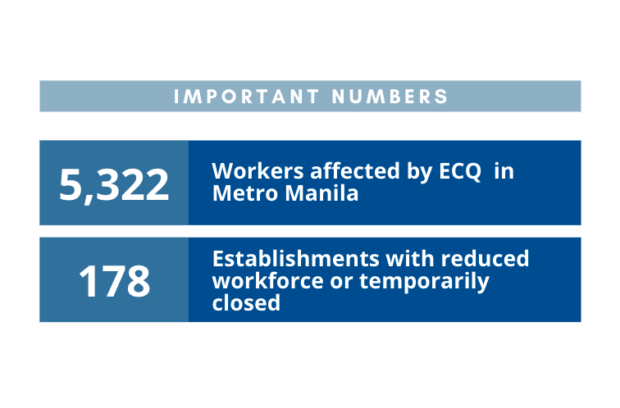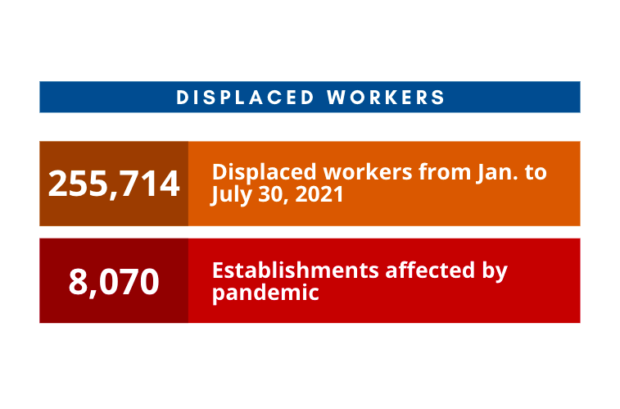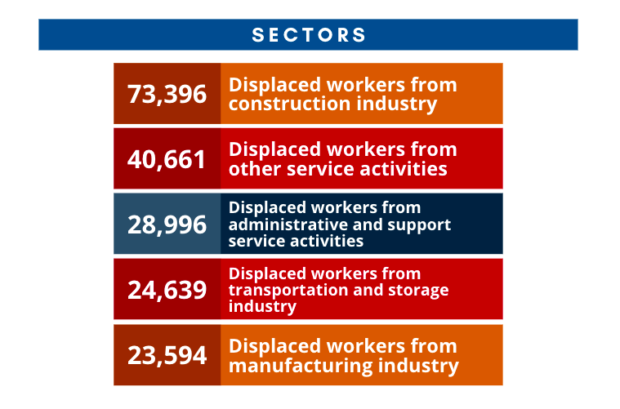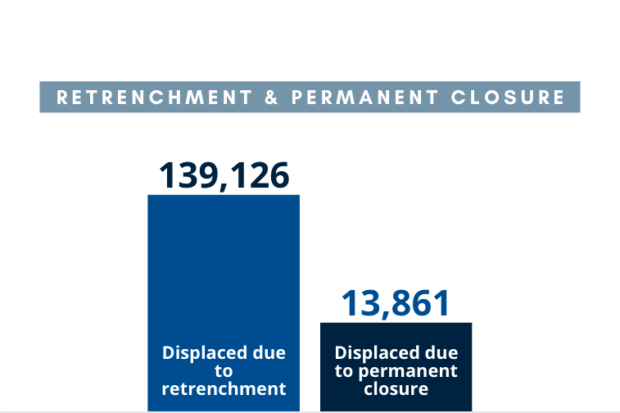New lockdown shuts employment door for displaced workers
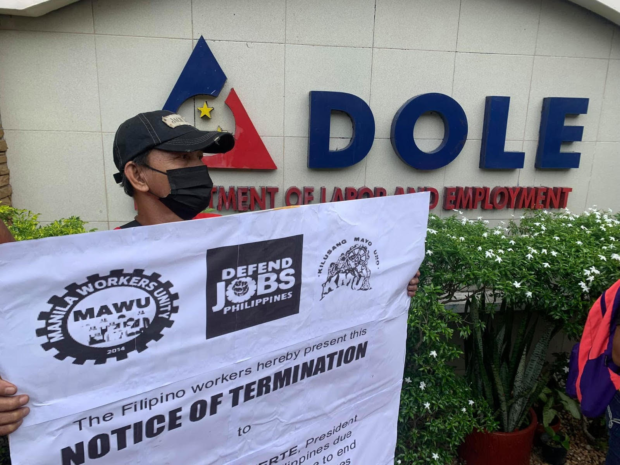
EPIC FAIL. A worker holds labor groups’ Notice of Termination to President Rodrigo Duterte for failing to fulfill his promises to Filipino workers during a protest at the Department of Labor and Employment office in Intramuros, Manila last July 19, 2021. PHOTO FROM DEFEND JOBS PHILIPPINES
MANILA, Philippines—Last July 30, the Duterte administration said residents of Metro Manila have a week to prepare for a hard lockdown but seven days were hardly enough time for jobless Filipinos to scrounge around for ways to make ends meet during the lockdown duration from Aug. 6 to 20.
Fear of uncontrolled infections from Delta, a more contagious variant of SARS Cov2 which causes COVID-19, prompted the fourth lockdown in an area that accounts for more than half of the Philippine economy.
READ: Metro Manila under ECQ from August 6 to 20
Under enhanced community quarantine (ECQ), the terminology that Philippine officials use for hard lockdown, indoor and al fresco dining and local hotel stays are barred, leaving countless of workers, who had just started to return to jobs in these sectors, in limbo again.
READ: ECQ begins: Metro LGUs locked down as separate ‘bubbles’
Article continues after this advertisementAssistant Labor Secretary Dominique Tutay said the ECQ’s impact was swift. At least 178 establishments are already closing or cutting their workforce, displacing at least 5,322 workers.
Article continues after this advertisementREAD: ECQ to affect unemployment rate in NCR Plus – DOLE
One of them is Christian Geling, a fast food worker before he was retrenched when lockdowns killed many businesses.
He said the impact on him was tremendous since he and his family relied only on his job for their needs, especially for the needs of his dad who has a heart disease.
Bianca Gavino, an interior designer, said the lockdown “brought problems” as her employer has decided to “shut down” operations for two weeks.
“None of us will be receiving two weeks worth of salary,” she said.
She added that she and her co-workers were forced to work from home after three people in their office got infected. “We’ll only be receiving 50 percent of what we usually earn in a week,” she said.
Gavino said she believed many people would become poorer during the lockdown as those already suffering from lack of income won’t be able to provide for their families.
“If ever the lockdown is truly essential and will really help decrease the number of cases, then the government should help provide families, especially the least fortunate ones, with food, water, toiletries, and other necessities,” she said.
READ: COVID-19 Delta variant can spread as quickly as someone just passing by – expert
Thousands displaced
Data from the Bureau of Local Employment (BLE) of the Department of Labor and Employment (DOLE) said from January to July 30, 2021, 255,714 workers had lost their jobs in at least 8,070 establishments. At least 6,855 of the businesses reduced their workforce while 1,215 shut their doors permanently.
READ: Pandemic casualties: 4.2M lose jobs, 7.9M suffer pay cuts
The BLE Job Displacement Report said that in Metro Manila, 4,340 establishments were severely hit by the lockdowns, displacing 152,987 workers.
READ: Loss after loss: Locked down restaurants pushed to brink of collapse
At least 139,126 had been displaced in retrenchment programs by 3,793 establishments. At least 13,861 lost their jobs when the establishments they were working for permanently closed.
The BLE said workers from industry sectors like construction (73,396), other service activities (40,661), administrative and support service activities (28,996), transportation and storage (24,639), manufacturing (23,594), and accommodation and food service activities (12,983) had been displaced.
Making ends meet
Before Geling was laid off, he said that his gross income was P40,000 per month. However, after his retrenchment in the midst of the COVID-19 crisis, he found it “difficult” to make ends meet.
“My father has a heart disease and it looked like it got worse when he knew that I was laid off from work,” he said.
“Looking for work in the midst of a crisis is really hard. The financial help given by the company to workers who were laid off was likewise not enough,” added Geling.
According to a self-rated poverty survey by the Social Weather Stations last May, in Metro Manila, the threshold is P20,000 per month for Filipinos to be able to provide for their needs. Geling would need more than that for his dad’s medication.
The group Defend Jobs Philippines said workers, because of the lockdown, find it hard to survive even if they retained their jobs because of so-called flexible work arrangements which also meant lower pay.
READ: Palace orders gov’t agencies in NCR to lower on-site staff to 20% during ECQ
Christian Lloyd Magsoy, the group’s spokesperson, said a worker who is paid the basic salary can earn at least P7,000 in 15 days but the current situation brings less.
READ: Nograles unsure if Metro Manila ECQ good for only 2 weeks
Flexible work arrangements
The BLE said that similar to other sectors, “stricter community restrictions may lead the companies in adopting flexible work arrangements and retrenchment.”
READ: Mass layoffs worst in Q4 2020
From January to July 30, 2021, 24,715 establishments with 1,101,211 workers had resorted to flexible work arrangements.
The BLE said that flexible work arrangements included the following with the corresponding total of affected workers.
• Reduction of workdays – 742,851
• Rotation of workers – 278,594
• Forced leave – 49,179
• Others – 69,138
• Lack of Market/Slump in demand – 140,417
• Assignment of employees to other functions – 9
• Broken-time schedule – 2,891
• Compressed work week – 3,578
• Job rotation – 32,606
• Partial closure – 17,156
• Reduction of work hours per day – 40,652
• Transfer of employees to another branch/outlet – 5,174
• Telecommuting work arrangement – 41,817
Retrenchment or reduction of workforce was mostly resorted to by small enterprises while there is a higher incidence of permanent closure in micro enterprises.
Financial aid
The DOLE said that from Aug. 6, 167,000 workers in Metro Manila would be displaced by the strict lockdown—40,000 workers who risked being laid off and 127,000 workers who could see a further reduction in their pay.
According to BLE, the Inter-Agency Task Force Small Working Group on Social Amelioration convened to discuss the possibility of financial aid to those who would lose jobs.
READ: DOLE needs P2-B budget to aid displaced workers amid pandemic
Last Wednesday (Aug. 4), DOLE said it has requested a P2-billion supplemental budget for continuous assistance to displaced workers amid the COVID-19 pandemic.
The department initially said it would tap P4 billion in its emergency employment program to provide financial aid to workers displaced by the lockdown.
TSB
